In under a year, Intercomm has quickly become one of my favorite places in New York City to witness art. Under the care of esteemed artist, curator, and organizer John Pugh, the artist resource center has hosted adventurous live music programming, space for open-forum dialogue within the city’s DIY underground communities, free sci-fi film screenings, and sound installations, among other transitory happenings. A musician, Pugh has an extensive CV spanning sound art and installation work, touring as the lead percussionist and songwriter for internationally renowned “chk-chk-chk,” and a brief stint in commercial jingles.
Now, he shepherds our slice of the city in presenting post-genre and multidisciplinary experiences. As an organizer myself, Pugh is one of the most important sources of information and insight on facilitating community across DIY music scenes.
A cat meows off-camera.
John Pugh (JP): Jean Grey. That’s the name she was given by the adoption clinic I got her from. She’s kind of weird and psychic, so Jean Grey.
Yaz Lancaster (YL): I love her! I’m excited to talk to you. I’m planning on a short run of interviews with other folks active in the DIY experimental scene as organizers and show curators. Naturally, you’re the first person I thought of. I’m really curious about you and how you got to Intercomm.
I usually start all of my interviews with this question – What is your first musical memory?
JP: Let me think. How young was I? It’s hard to remember because I was surrounded by music. My dad was a preacher so I was going to church every Sunday. The church I grew up in had a massive church organ. The organ is this massive, vibrational, almost architectural structure built into the building. Everything’s wood and resonating. It was louder than anything. Growing up in church, I was either in choir or was an acolyte – or was working the soundboard. That’s where I learned how to do sounds.
I’m also thinking about the cassette tapes of me that my mother would make. She would record me singing theme songs from Star Wars, Superman, Flash Gordon, all the movies I was into. I would just sit there and sing the theme song, and she would record. So there’s tapes. I started making cassette tapes at age four onward – we always had a tape recorder in our house. My parents were never interested in technology. We never had a computer growing up. It was all record players and tape recorders.
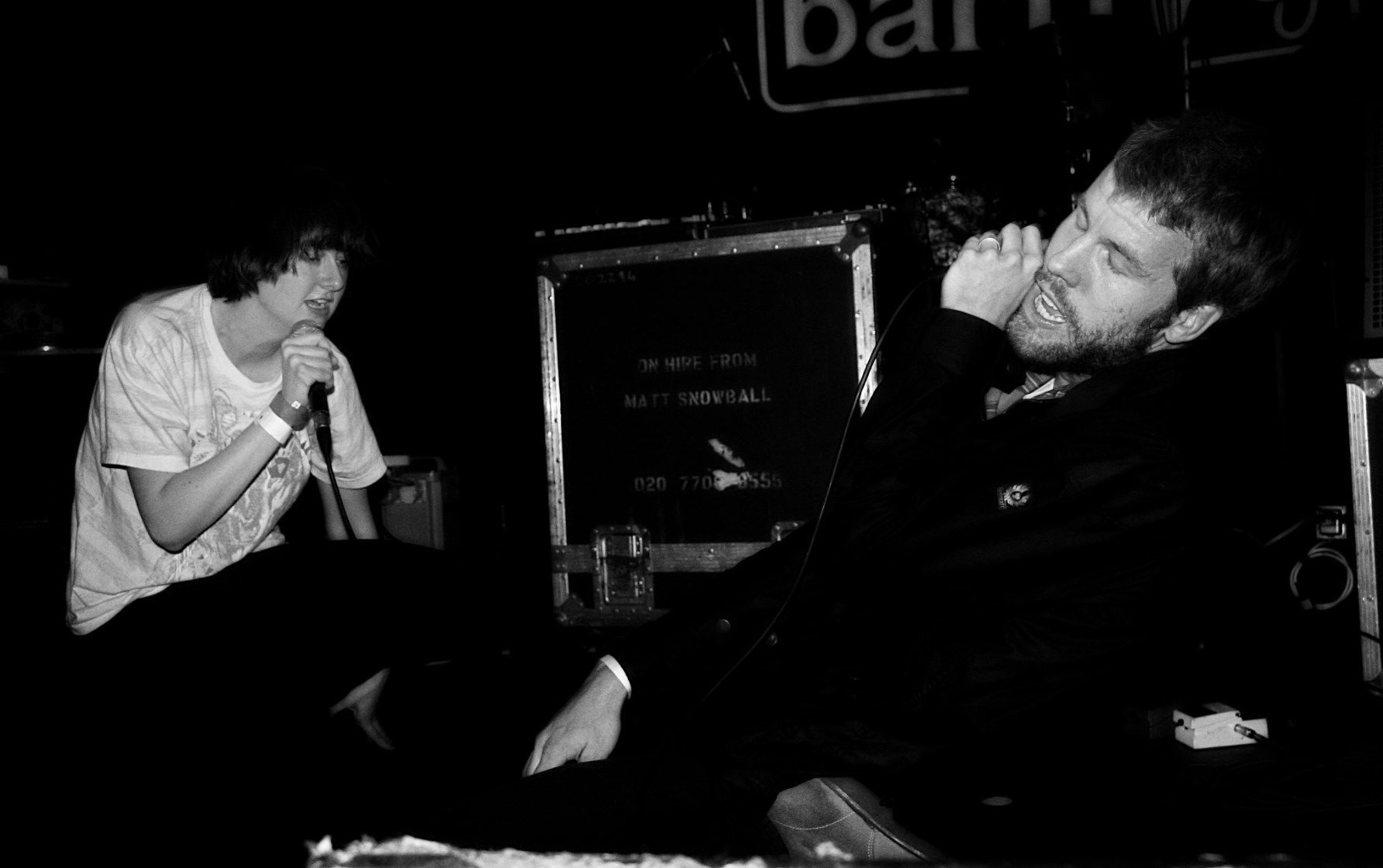
JP: I rarely use a computer now except for work purposes. It’s hard to be creative with a computer, but that’s my experience. When I started playing shows, I was going through a thing where live music with a computer on stage was something that was unheard-of. It was almost looked down upon. Like Oh my god, what are you doing? Checking your email up there? You can’t rock out with a laptop, just like ‘click, click, click, click, click, click’ triggering the sounds. Just get a guitar or a drum, an actual instrument. So I came with certain prejudices. But then I started seeing things like Dreamcrusher or Mercury Symbol. Or I’d see other people whose first instrument was their laptop. That was what you had if you were a kid in the 90s and 2000s.
A lot of people were using it in advanced ways, which interests me because it’s taking technology and exploring ways that it’s not supposed to be used, and creating a practice of testing its extremes and limits, and cross-pollinating things that are not supposed to mix together. That’s the thing I’m interested in… A lot of explaining why I’m so fucking analog still now.
At Intercomm, I don’t have wifi, I don’t have a bunch of computer gear or interfaces and stuff for that. I think about disaster-proofing – making sure that your art can exist even if all the servers are down. It’s figuring out ways to do what you do under extreme circumstances – that’s the future. Improvising and multidisciplinary artists are resilient in that way, and much more prepared for disaster.
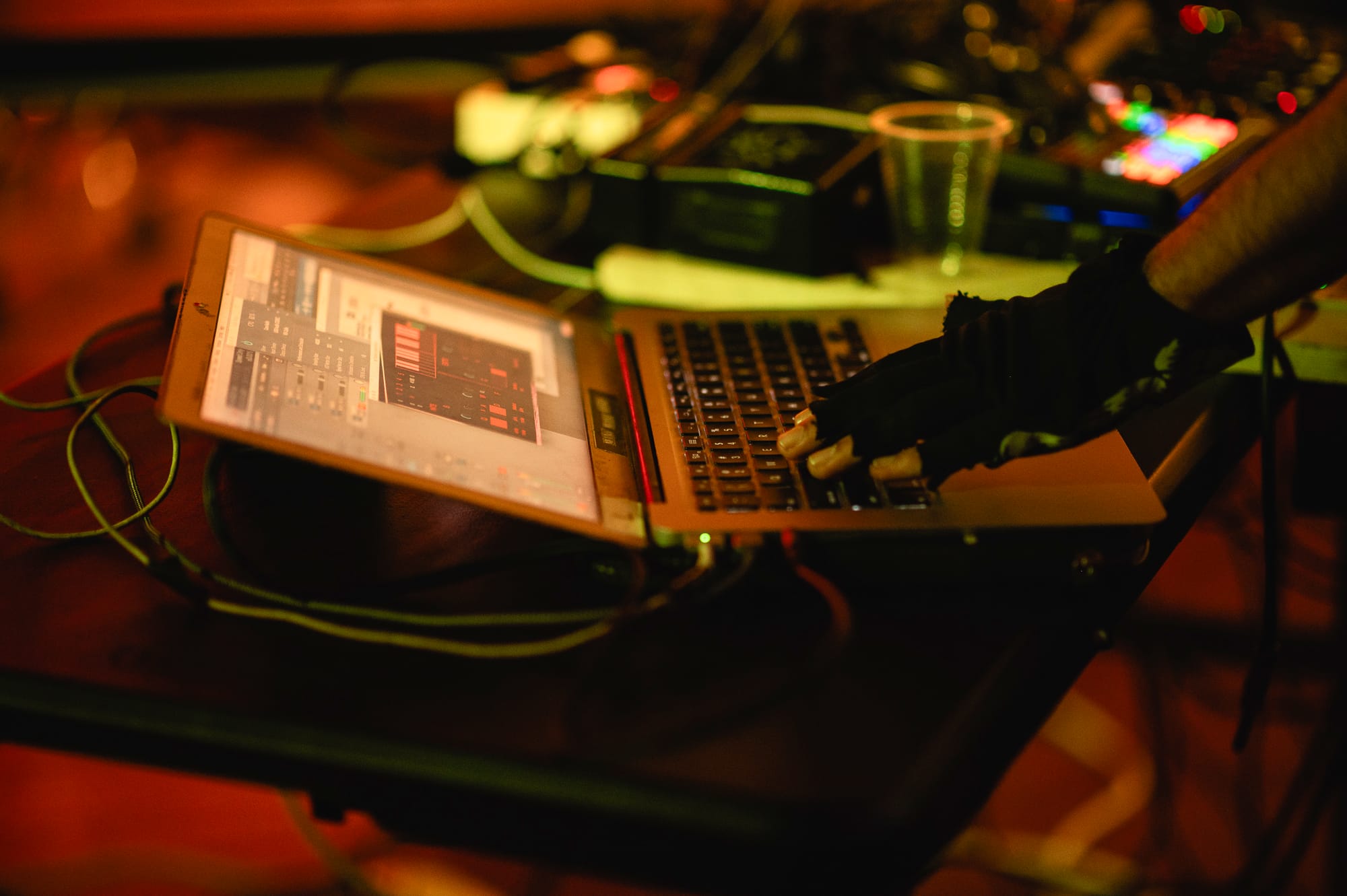
JP: Covid-19 really took the entire hierarchical systems that had been set up in every industry and turned it upside down or sideways. It shook the box around, and everyone who had enough in place held on with a death grip. Other people got thrown around the room and figured out a different place to be. All the dancers started being painters, all the painters started making films, all the filmmakers started making noise… You know what I’m saying. Everyone kind of kept doing what they were doing, but they also expanded or pivoted and just let themselves let go of the structure of genre.
The confusion of What are we doing? Why are we doing this? What is this pyramid scheme of the music industry? I think everyone really questioned why we’re participating in this kind of Ponzi scheme. I think it’s a generational shift because this structure is a byproduct of the 20th century.
Youtube was like the first taste of DIY for everyone. I can make my own entertainment. I can make my own news channel if I wanted to. And people are informing each other. That’s exciting to me. But we also know it’s toxic. Now it’s a bunch of remakes. This churn of culture is like reheating the same bowl of rice and beans they’ve been reheating since 1952 and boomers keep spooning onto our plates. It’s this half-remembered version of nostalgia. I’ve been alive long enough to see this churn happen three times.
There’s another aspect of degradation brought on by AI. Every time I go to play pool they’re playing some Spotify mix of the early 2000s – 20 years ago – which is nostalgic for older millennials around me. It’s all these artists saying We’re just gonna ‘pop’ the fuck out of all the music. We’re gonna steal everything from hip hop and Black soul music from the 20th century and just whitewash it to fuck. They all start to become anthems of a certain chord progression that you realize could all be built by AI.
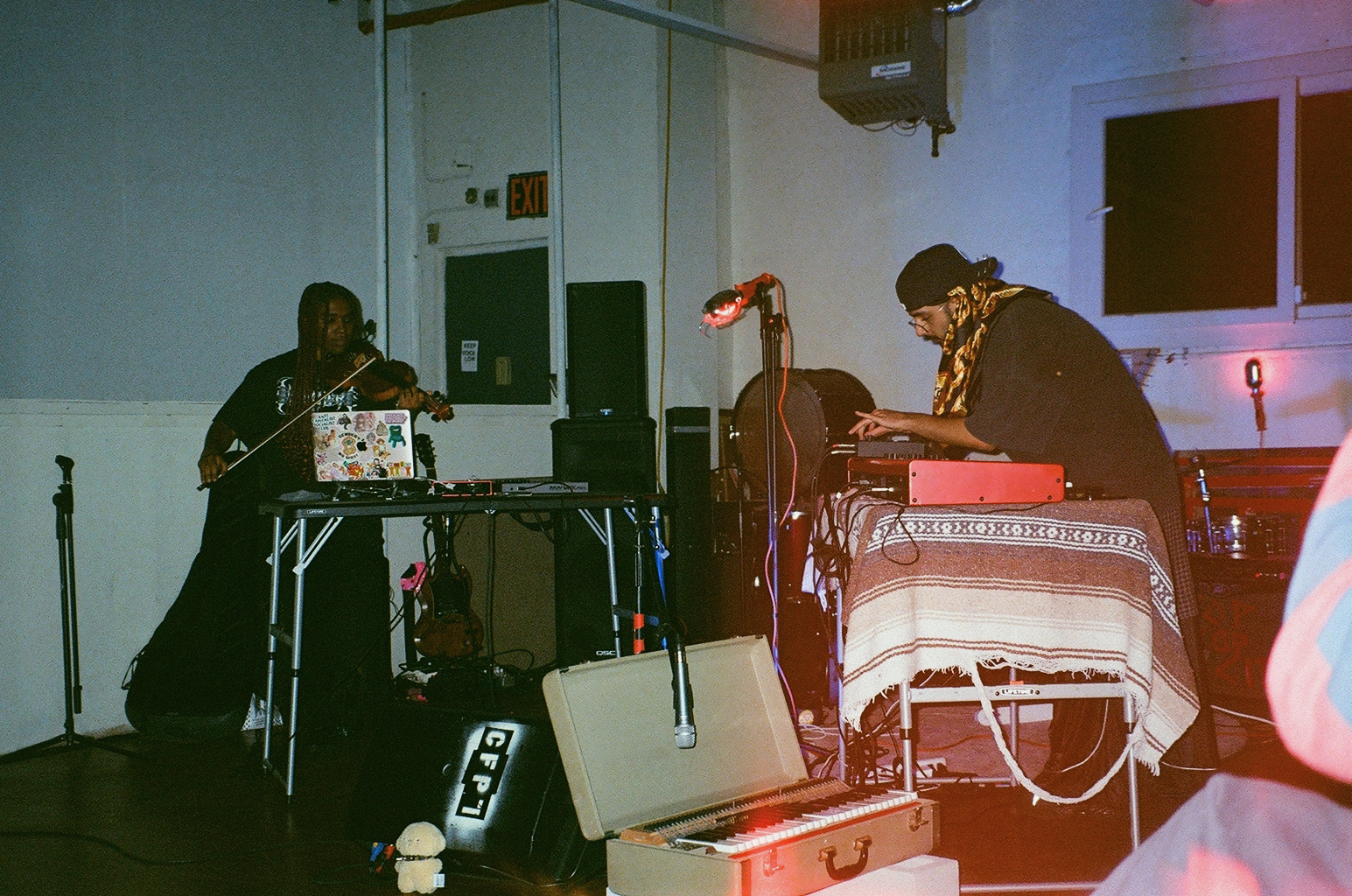
JP: Having grown up in the 20th and 21st centuries, I’m waiting for pop music to sound totally fucking insane. Future music from 2025. All that being said, artists like “medium.” and Dreamcrusher are doing that. That’s what’s happening outside of this churn, and that’s what’s exciting to me.
Intercomm is a space to present experiential work that you don’t just sit passively and look at. It’s not all interactive, it’s more like active listening and participation by your presence. The kind of ritual and intention should be put into making music alone for yourself versus in a room in front of other people. That shouldn’t matter. You also have to remove a lot of the numbers and ego. I ran into a great friend of mine who is a booker, and his mind really works on numbers. He’s in a realm where he talks to booking agents and not artists themselves, and looking at streaming numbers and Instagram followings. I never look at this shit. I see someone in real life in the room, and I’m like Oh yeah, this would make sense at Intercomm.
I have a luxury because I’m not trying to pack out the place. For each event, I have a fiscal sponsorship that allows me to pay artists 100% of what comes in the door. If you’re broke as fuck today In New York City in 2025, you don’t have to pay a dollar – just help us clean up some beer cans afterwards.
I have to be very aware of the neighborhood I’m in, and my neighbors know my landlord personally. But I’m consistently transparent. 95% of the time I am a law-abiding citizen just cleaning up trash on the block. One of the bedrock ideas for me behind DIY as a thing is that you actually have to do more for yourself and for everyone around you. You clean up after yourselves. If something’s wrong, you fix it. It’s not about being a total fuck-off and trashing a spot – that just says how little you care about reality.
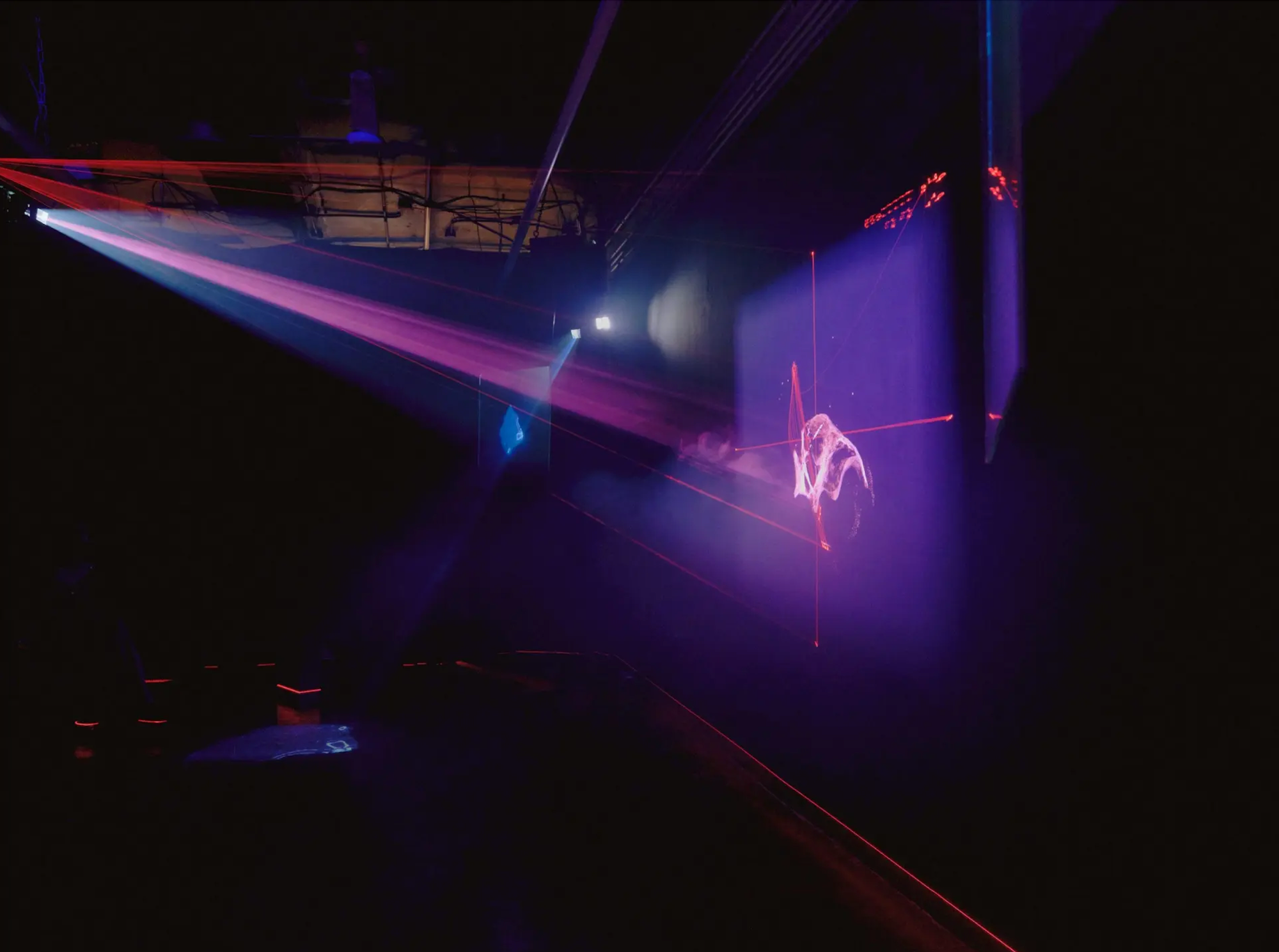
JP: We’re not calling [Intercomm] a venue. It’s an artist resource center, a gallery… When there’s an open public it’s what I’m calling a sound exhibition or performance exhibition. Everyone understands it’s a one-night thing. I’m trying to get into more of a practice of having daytime programming, and open studio appointments.
I’m working on building out the website for Intercomm. There’s a page inspired by Voluminous Arts stating what the intention is. It’ll be explicit so that people understand that these things need to be made explicit by artists – we can’t just opt out and not say “Free Palestine” because you don’t want to alienate somebody. I think we’re seeing in real time more of an understanding that the legacy of art is interwoven with activism. That’s definitely a part of all the activities I do in Intercomm.
It’s moving away from a dynamic that is dependent on a scene in a certain way of being, and moving towards the natural messiness of community. I feel like sometimes people use the word “community,” singular. We’re talking about plural communities. Walk into any “community,” and start talking to people, and you’re like Oh, we’re all from many different communities. I don’t want to go back to the scene politics and gossip. It’s a dead end.
The people who have longevity decoupled themselves from any scene a long time ago, and they’ve been working within communities. You don’t need to drop names around me. The people I know, the people that are ‘famous’ to me are noise artists, experimental artists, performance artists who’ve been operating in New York City since 2015.
YL: Wait – Hold on. I have the cheap version of zoom, I’m going to send a new link so we can rejoin.
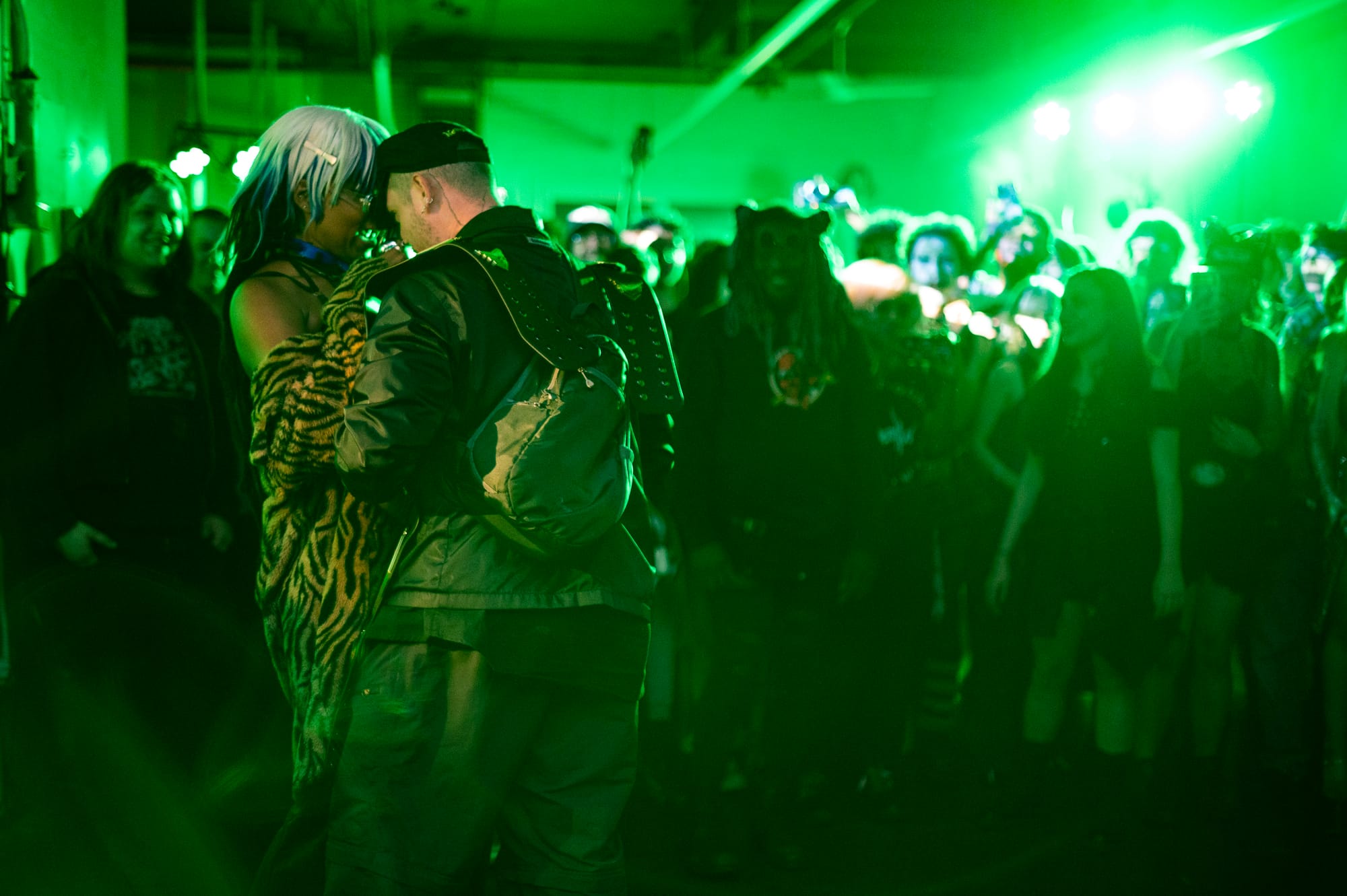
YL: Okay, we’re back. Sorry about that!
JP: And we’re back. That’s my long answer to my first music thing. I’m gonna go on and on unless you stop and tell me.
YL: No, this is the easiest interview ever. Please keep going.
JP: Start me talking!
YL: Let’s go backwards again and reset. How did you start organizing events?
JP: I grew up in Little Rock, Arkansas, and was part of an early 90s wave punk circuit that was being built through zines and people trading tapes. Pre-internet punk circuit. We were all 16-17, and it was pre-Green Day and Nirvana punk. It was mostly kids that are too young to drink and just caused trouble and graffitied up the bathrooms. So the one club in town that booked metal and rock shit didn’t book any punk bands.
So we just went down to the river that nobody went to except for state kids and homeless people. We found an outlet that was sticking out of the wall. We started plugging in a power strip to do shows on the fly. That was my on-the-ground training on how to run a show, and how to talk to cops, and how to crowd control. How to put together a bill that made sense, make flyers, all those things.
And then fast-forward, I was a touring musician for a long time. And then I made studio music for commercials and TV and movies – like background music. I was going through a creative crisis where I had stopped performing on stage in front of people for a while. It started to become a conceptual performance art practice, and it was almost like a remedy because I was making these highly, highly commercial jingles. You had to kind of always keep a ball in the air and always sound better than you were. You had to carve it into that perfect object of a formula that was familiar, but not ripping something off directly. That was exercising a different kind of creative muscle I never had to exercise.
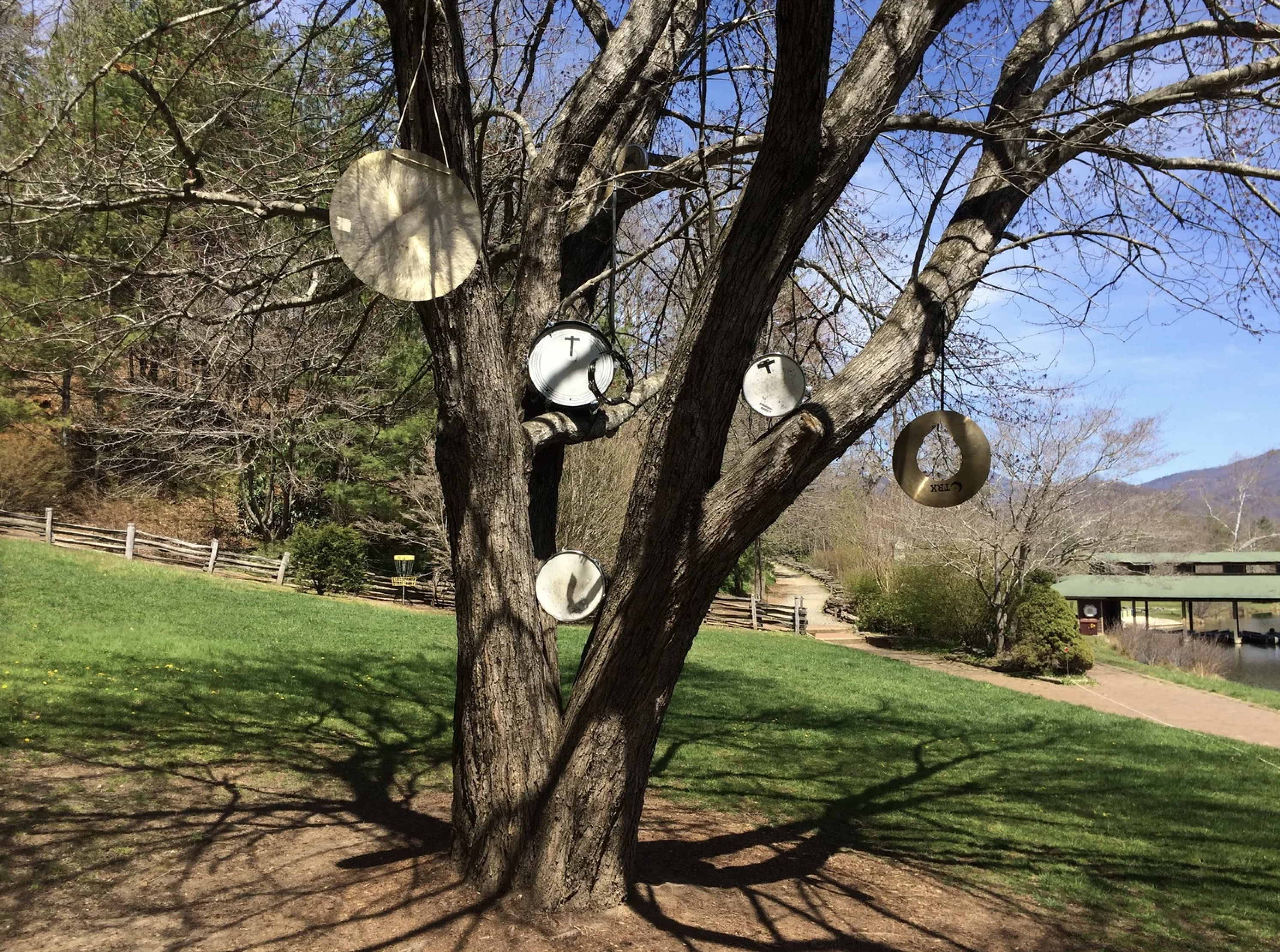
JP: My counterweight to that was digging into a sound art practice. I found a studio with Sam Hilmer who was doing a lot of curatorial work. He got offered a space to do shows, and needed someone to run sound – or just an adult person to be on the crew because he had assembled a crew from the remnants of Trans-Pecos losing its liquor license in 2015. He was starting this thing called H0l0 – It wasn’t called that yet, but it was in the building that is now H0l0. That was me being reintroduced to what was going on in Bushwick and Ridgewood as far as experimental music and nightlife.
It felt like a fish in water kind of thing. Part of that was all my skill sets leading up to that starting from when I was a teenager doing DIY shows in parks. I loved it because part of it was that I wanted to do my version of it somewhere. I really wanted to take this kind of energy and interaction out of this basement rave cave – I’m still very much pro-rave cave though – to see how we could operate outside of the natural capitalism of having a bar, a security guard at the door, and the whole formula. You need an ATM because you have a bar, you need three working toilets because you have 300 people coming in every weekend, you need to be good with the Department of Health, you need two sinks, all these bells and whistles. We just need a place that is well lit and you can be loud as fuck and a working toilet. That’s Intercomm.
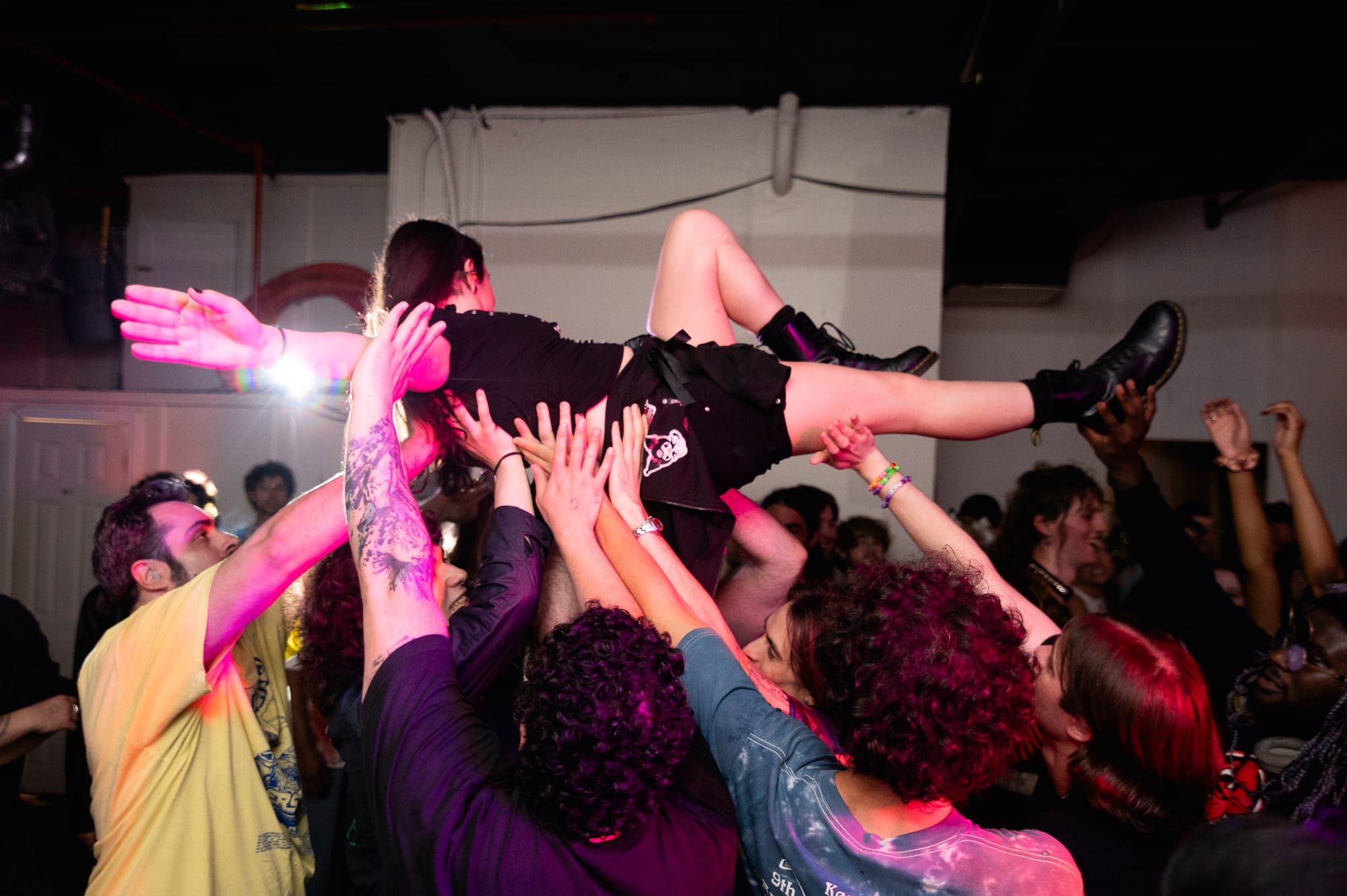
JP: In 2020 I was renting a desk at one of those office work share places in downtown Brooklyn. Then Covid hit and everyone went home, except for me, and one architect who was way in the corner for a good year. I was using the empty space to invite people to play streamed quarantine concerts. My friend Carlos would film them and record it, and then I would stitch it all together into a little TV show. Or some people would send me pre-made videos they made themselves too. That’s where I started doing the curatorial thing. Finally they caught wind and I got kicked out of that studio.
By the end of 2021, people were doing events. I was doing events at Trans-Pecos, Living Gallery, wherever. I did a show on 2/2/22 at Trans-Pecos and it went really well. Then I wanted to start doing a monthly thing, and not worry about finding my own space yet. I needed to build the practice first and create a curatorial name for myself, which I did all through 2022. I did shows here and there, never at the same place in a row – It was a roving Center for Psychic Technology once a month. In the summer, I did my own thing in Prospect Park. By the end of the year, I got a job at Trans-Pecos. I was brought in specifically to open up the experimental avant-garde underground noise worlds.
Fast-forward to 2024 – I just took a step back from Trans-Pecos and Pioneer Works, and started looking for a spot. October of last year is when I found the building that happened to be tucked in this little corner of Ridgewood that is very populated with artists and people who are generally interested in this kind of space.
YL: Wow, yeah, and you opened in November. I was at that first show.
JP: That’s right, November 2024. I never went to college, I didn’t get any kind of degree in anything of substance that I could apply to a career path. I envy people who got to do that deep dive if they went to college and enjoyed it and got something out of it. With Intercomm, I want to build it into a place for deep dive learning, and a place to convene with other people who want to get into the deep investigative work of art making.
I have this push as a curator to push other people, as listeners and artists and participants, to places that they’re not familiar with. I feel like this is where liberation exists. I think getting out of the comfort zone leads you into a deeper, more natural, or more primal state of humanity, and nourishing it. Letting it find the rhythms and communication beyond language and these structures of socialization.
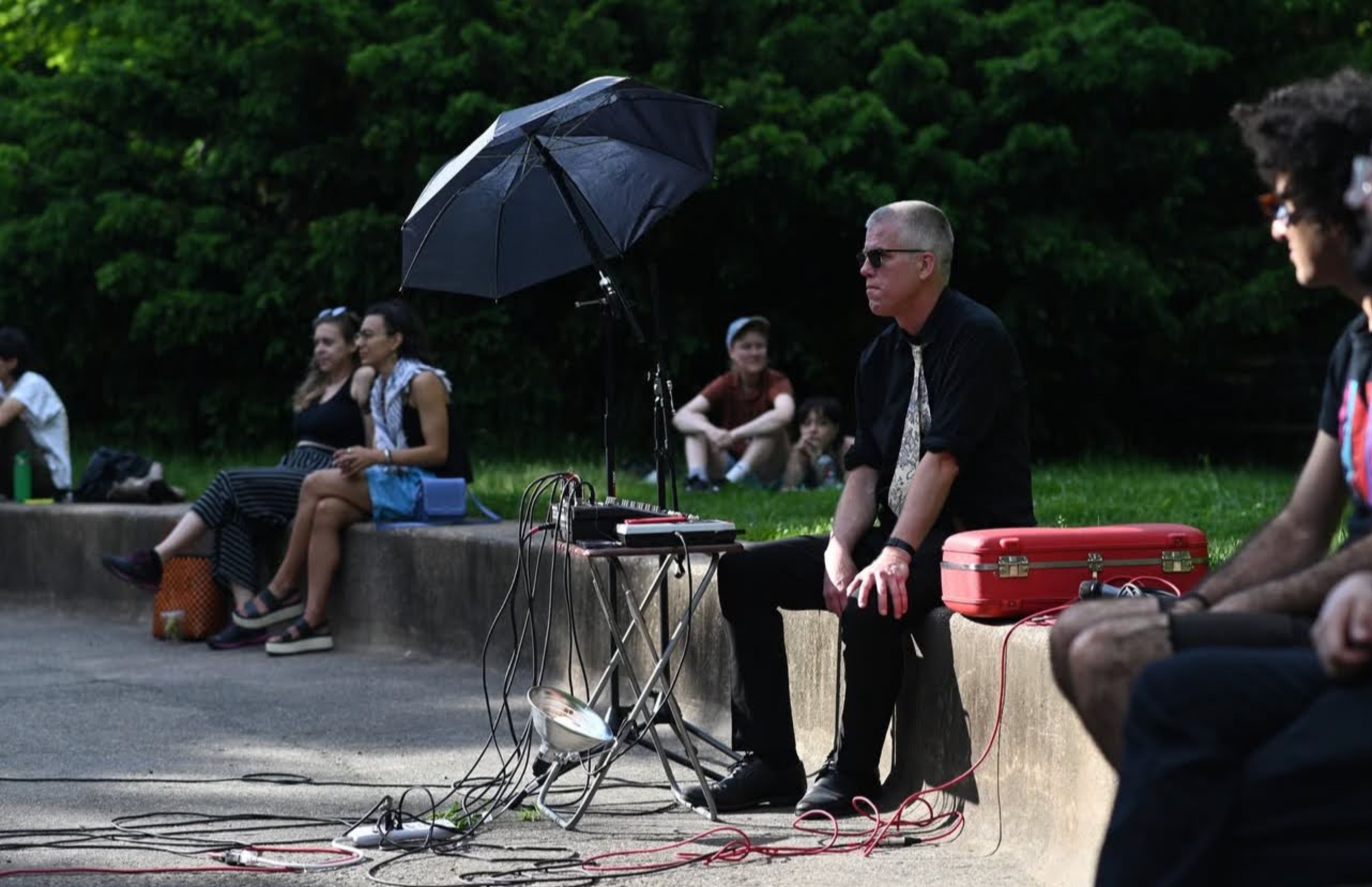
YL: Honestly, I think you’ve hit everything I could’ve possibly asked you, and then some. Thank you so much, that was awesome. Here’s a fun one though. I asked some people if they had any questions they wanted me to ask you, and this one came up several times. Everyone’s wondering – Why the suit?
JP: *Laughing* Oh, why the suits?
YL: Yeah. If you can answer that in exactly two minutes before this zoom cuts off.
JP: Two things. I grew up in church and I always wore a suit and tie. That was your Sunday dress. I grew used to it as This is what I wear when it’s a special occasion. Sometimes it works, for fun. So if you see me in a suit, it means that experimental music and performance is church for me. It’s me giving reverence to the event. Or I just have dirty laundry and everything is dirty except this.

